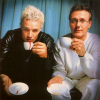
My post-CONvergence update will be a little late, as I have been distracted by allergy medicines and a fog of con crud. Strangely, the two brain cells I have left, are rubbing together on another topic: how writers are role models.
Writers can be cave trolls and never interact with other human beings, but there’s a lot of pressure to blog, be at conventions, go to workshops, etc. What do we blog about? Sometimes our work or lives, which includes commentary on social ills that we encounter. Now, the question is: when a topic, like gender equality, comes to the fore — does that have an effect on fandom?
Yes. Yes, it does. As one example, I overheard several fan conversations at CONvergence while I was lurking in the background. Fans trying to educate a friend who didn’t understand why stereotypes were bad. How sexual harassment can be a problem for guys, too. That they never realized how awful it was for women in different situations. Etc. Etc. Etc. We may be behind-the-scenes, but conversations on heady topics will make fans (and those surrounding us) think. Discuss. Learn. Is it “dangerous”? No, it just means that the writer provides the spark of inspiration and fans will be inspired to think. This, in my opinion, is a good thing, but the depth of conversation depends upon how that topic is presented as well.
From something as simple as “love” to a hateful word like the “n-word,” words are containers that carry weight. It is not censorship to suggest to someone they should think twice about what words they’re using. Why? Because the expression of words is a gift. You are giving words to someone who will receive them, interpret their meaning, and assess their value.
As an example, you can’t walk up to [Insert Very. Famous. Author. Here.] and say: “Dude, your book sucked. Can’t see why anybody would waste money on it.” and not expect a reaction.[1] What would you expect the V.F.A. to do? Shoot back with something witty? Or tell you to write a book of your own? You were being rude and that comment has a consequence.
I know we’d like to think that writers are wordbots who sit at our computers all day, then don skin suits to be out in public, but we’re not. We’re very human and when fame hits us, in any context, we deal with it in different ways — in part because we’re not trained to be celebrities. Being a celebrity isn’t just as simple as having fame, it’s also a job. Suddenly, there’s that feeling of having less freedom. We don’t get to “be a asshole” or “act like a bitch” because we have an audience that’s relying on the gift of our words. The greater connection to our audience (e.g. the internet), the less “free” public figures are.
When a V.F.A. says something like “striped socks are evil” and it’s taken in a negative context, it’s because the audience isn’t receptive to that statement. The V.F.A. should expect consequences. Those words are a point-of-connection from reader to writer and it doesn’t matter if that author wrote a great book or not. Some people will care what was said; others won’t. But, the fact of the matter is, it’s the human-to-human connection that’s influencing decisions here — not just the human-to-inanimate object (e.g. book).
And that, dear reader, is what I feel freedom of expression means. It’s not just about what you say, it’s also about how the listener incorporates the meaning of your words (both semantic and litera) and responds with words of their own. Or, in other words, say whatever it is you want — but be prepared to deal with the consequences both positive and negative.
[1] I wouldn’t try that on any author. I employed the power of the V.F.A. to support my later point.
- Mood: Dude, where’s my wordcount?
Caffeinated Beverages Consumed: I SHALL NOT REVEAL MY STATE OF CAFFEINATION FOR FEAR OF IMPRISONMENT.
Work-Out Minutes Logged Yesterday: I think my eyelids fluttered once or twice.
In My Ears: Touch by Daft Punk
Game Last Played: Final Fantasy XIII
Book Last Read: Can’t remember the title. I blame con crud. 🙁
Movie Last Viewed: Some Disney crap with singing in it. (I fell asleep.)
Latest Artistic Project: *Still* *still* *still* need to take pictures…
Latest Release: “The Button” We Are Dust anthology and for gaming, a fun Scion: Extras (Supplemental Yet Can Be Somewhat Useful On Occasion Scions)



Comments are closed.